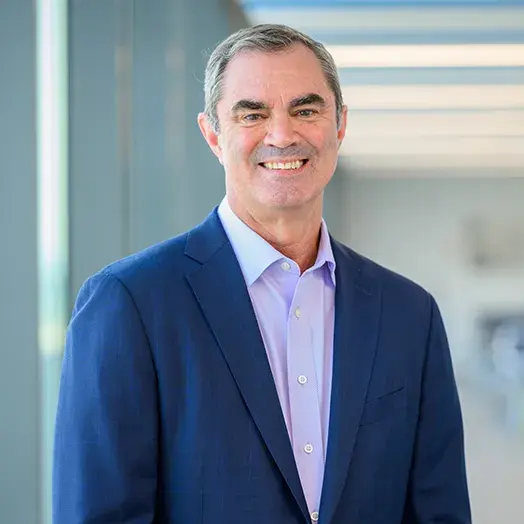Program Director David Smith explains how Carey’s new Executive MBA is designed for experienced, working professionals aiming for advancement.

Ask the APD: Executive MBA Academic Program Director David Smith discusses new degree program for working professionals
Beginning in fall 2026, Carey Business School is launching an Executive MBA program designed for senior working professionals ready to improve their skills or advance in their careers. The cohort-centered curriculum features a mix of online courses and in-person residencies at the Johns Hopkins University Bloomberg Center in Washington, D.C. Students can also specialize in the business of health or leadership with a tech-focused approach and award-winning experiential learning courses.
We sat down with Executive MBA Academic Program Director David Smith to ask some questions about what prospective students can expect.
Carey Business Schools offers several MBA programs, but who is the right fit for the Executive MBA?
The Executive MBA is built for accomplished professionals with proven leadership experience seeking to elevate their impact and take the next step into senior executive roles, including director-level and C-suite positions.
The EMBA is a 19-month program with a curriculum that includes online courses and in-person residencies. In designing the Executive MBA program, we were purposeful in creating a flexible format that we think works especially well for seasoned and senior leaders, and their busy work-life schedules. It will be a very busy time for our students, but our faculty and staff are ready to support them and help them accomplish their goals.
What sets the Executive MBA apart from other MBA experiences?
The Executive MBA program at Carey Business School is designed in a hybrid format, which includes a combination of residencies and online learning. Over the 19-month program, there are 14 months that typically include a three-day residency in Washington, D.C., at the Johns Hopkins University Bloomberg Center.
Our Executive MBA also offers students opportunities for specialization in leadership and strategy or health care, which are strengths at Carey Business School and Johns Hopkins. Of course, students can also take electives of their choice in other key business areas instead of a specialization.
Like our other MBA programs, the EMBA provides the foundational aspects of business, including finance, accounting, leadership, organizational behavior, and marketing. Most importantly, the program is built around business strategy with opportunities to do a deeper dive into foundational core course applications in today’s business environment, and also within their electives and other EMBA program courses. This is an opportunity to hone those business skills to tackle current workplace challenges.
The program concludes with the completion of our signature Executive Field Project, which pairs teams of students with real businesses to help them solve real issues. This is an opportunity for students to experience higher-level business problems firsthand and leverage what they are learning in their course work.
How is AI being integrated into the EMBA curriculum?
One of the components that we have purposely included within the Executive MBA is to integrate artificial intelligence tools in a variety of different contexts to address the opportunities and challenges presented with this emerging and exciting technology. AI tools are already here, and today’s leaders need to gain an understanding of how they can use and employ them responsibly.
AI is integrated throughout the EMBA curriculum within courses that demonstrate and practice the application of AI tools. In some cases, there are specific courses on the business uses of AI. These include everything from the ethical and responsible use of AI to special courses dedicated to specific AI applications that senior leaders need familiarity and experience with. In other courses, for example, Strategic Management, AI tools may be used to simulate how companies and leaders are reacting to various choices and decisions that are being made in a virtual business environment.
What to Read Next

business of health
Peter Grollman is leading and learning with purpose, for the futureThe EMBA experience will be based at the Johns Hopkins University Bloomberg Center in Washington, D.C. What does the nation’s capital add to the EMBA experience?
Positioning of the Executive MBA in Washington, D.C. provides special opportunities for student interaction with industry leaders who are headquartered and based in the capital region, as well as policymakers and strategy experts. The typical residency is three days—Thursday through Saturday at the Hopkins Bloomberg Center in Washington, D.C. Students will be attending classes during these periods, but they'll also have opportunities for networking, co-curricular experiences, and interactions with leaders and experts from across the Hopkins ecosystem. We’re inviting experts from other schools and disciplines at Johns Hopkins to create an intimate environment for connection with our students.
We designed the program to provide flexibility outside of residencies for busy senior leader schedules, while retaining the cohort experience. For example, after completing the first two semesters, students will attend online courses in the summer of their first year. There is also a fall term in the second year when they will be taking online elective courses, which do not include residencies in Washington, D.C.
There is a global component as well?
Yes, EMBA students will have a week-long global immersion with their cohort. Each year’s destination and focus are unique. The week-long global immersion counts as one of the residency periods. The purpose and design of the global immersion is not only for course work, but also to prepare them for their Executive Field Project, which they will be experiencing at the beginning of their second year.

